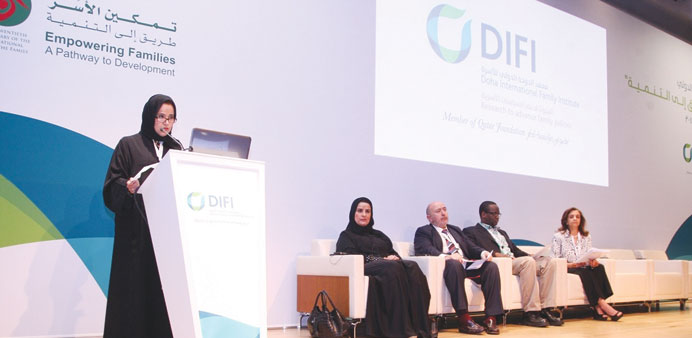Participants of the two-day International Conference organised by Doha International Family Institute (DIFI), which concluded yesterday, have called on governments to empower and enable families to contribute to development through a series of measures.
The conference was held to commemorate the 20th anniversary of the International Year of the Family under the theme “Empowering Families: A Pathway to Development”.
The participants, including representatives of civil society, academia, policy-makers and individuals, have highlighted 10 ways in which governments can help families make a significant contribution to development:
* Develop comprehensive and coherent policies, integrate a cross-sectorial approach to support family stability and establish/strengthen a national mechanism to develop family-oriented policies and programmes and allocate adequate human and financial resources to implement, monitor and evaluate them.
* Promote gender equality and the empowerment of women, reform discriminatory laws and policies, particularly family laws, and enact legislations to end child marriage and violence against women.
* Recognise the contribution and responsibility of men to families, develop policies to address the impact of the absence of males/fathers on family wellbeing and promote active fatherhood.
* Focus poverty alleviation strategies on the family as a unit and acknowledge that family breakdown can be both a root cause and an effect of poverty and its prevention is a priority.
* Adopt policies to ensure work-family balance, so that the responsibilities of parenting and maintaining families do not fall primarily on women and collaborate with the private sector to protect and support workers with family responsibilities.
* Value important contributions of all generations within the family, design and implement policies to strengthen intergenerational solidarity and partnerships and promote healthy intra-family relations.
* Ensure the systematic collection of data and statistics on family wellbeing and collaborate on good practice exchange at the national, regional and international levels.
* Develop and implement family-focused policies and interventions to strengthen and support families in vulnerable situations (such as conflict, natural disasters and health epidemics including HIV/Aids and malaria).
* Create an enabling environment for a meaningful contribution of civil society organisations in the design, implementation and monitoring of family policies and programmes and remove barriers to the establishment, work and funding of non-
governmental organisations.
* Acknowledge that families are at the centre of sustainable development and ensure that families are an integral part of the post-2015 development agenda.
DIFI is a member of Qatar Foundation for Education, Science and Community Development.

DIFI executive director Noor al-Malki al-Jehani addressing the conference.
